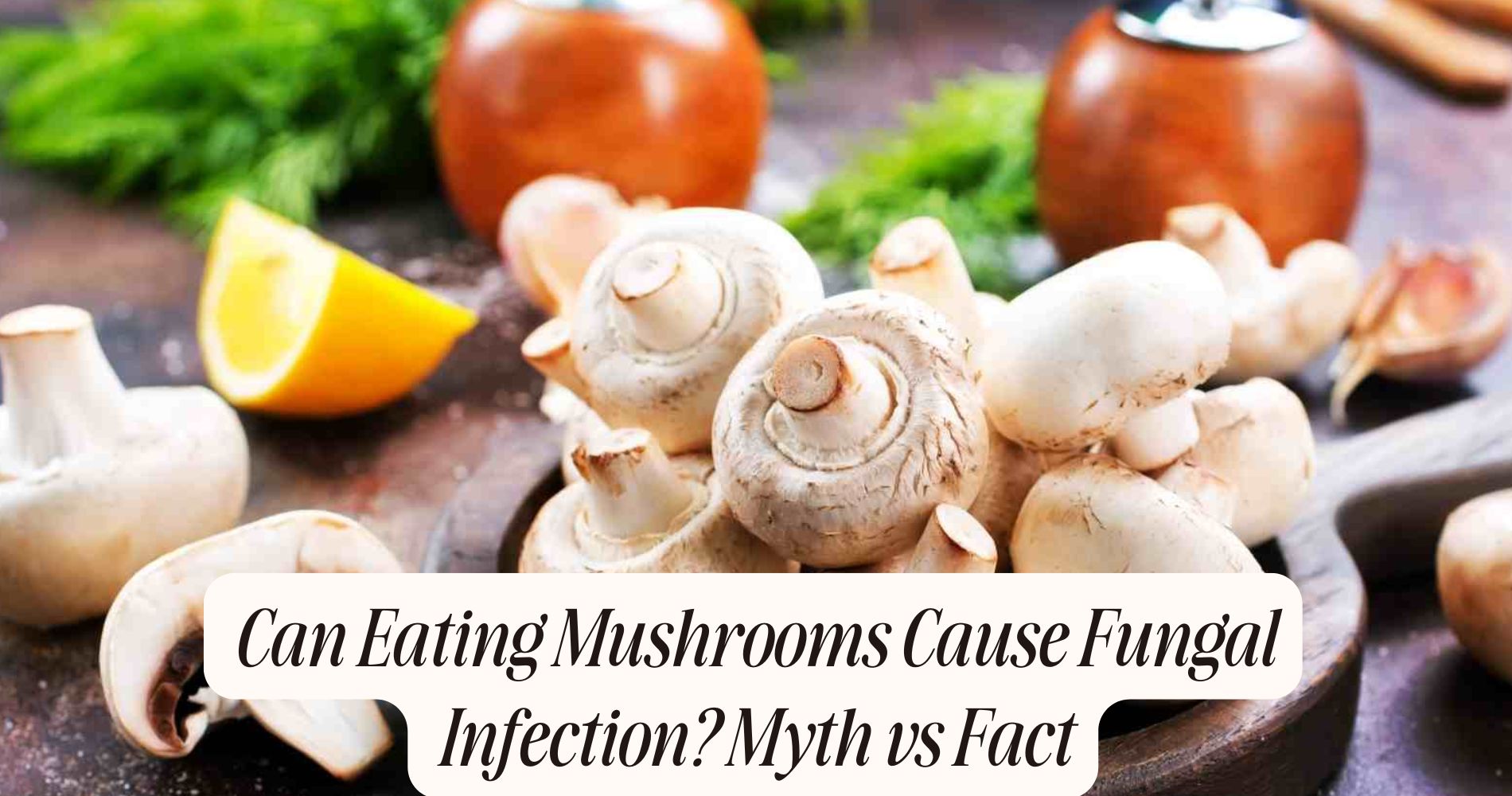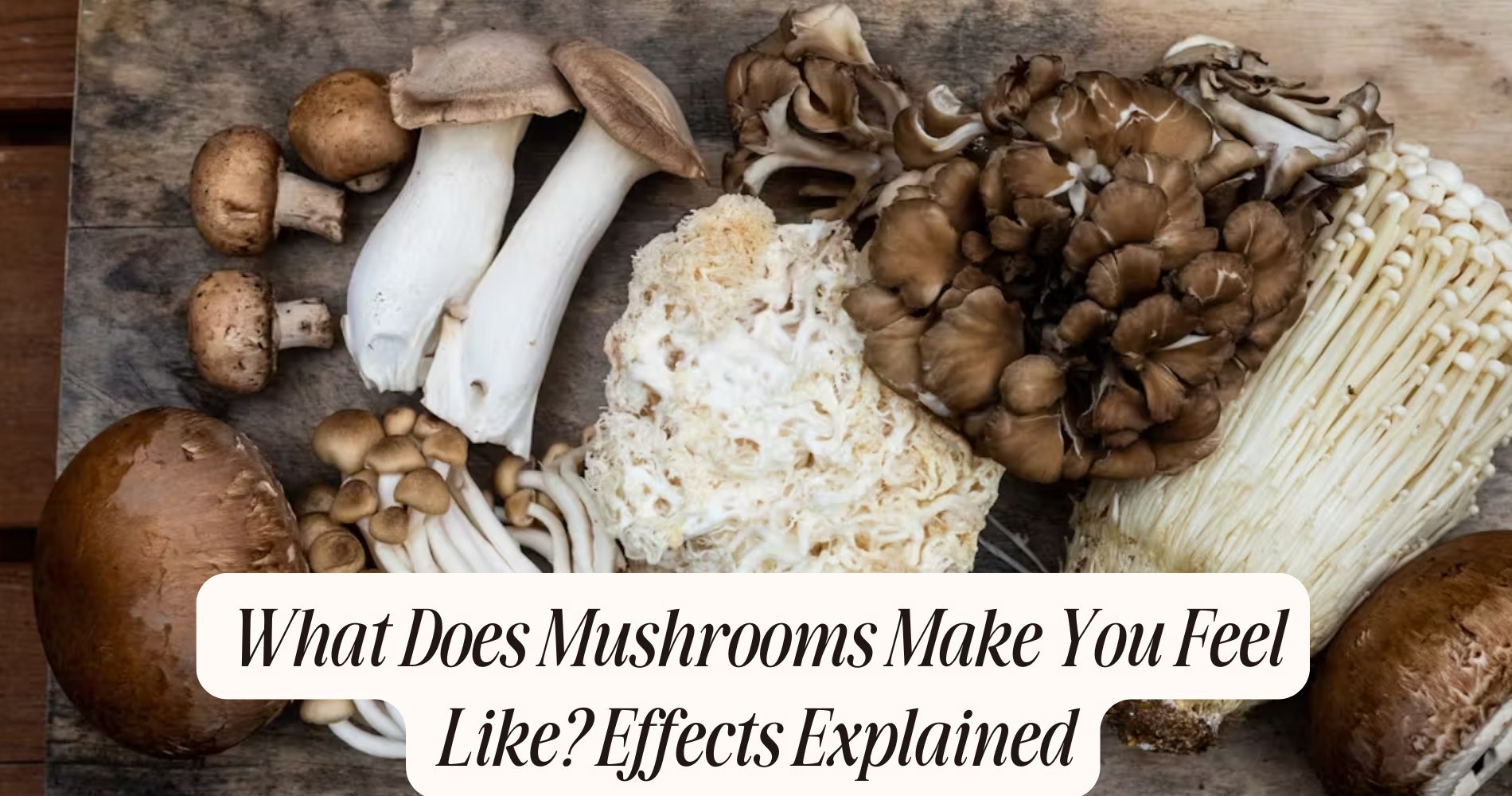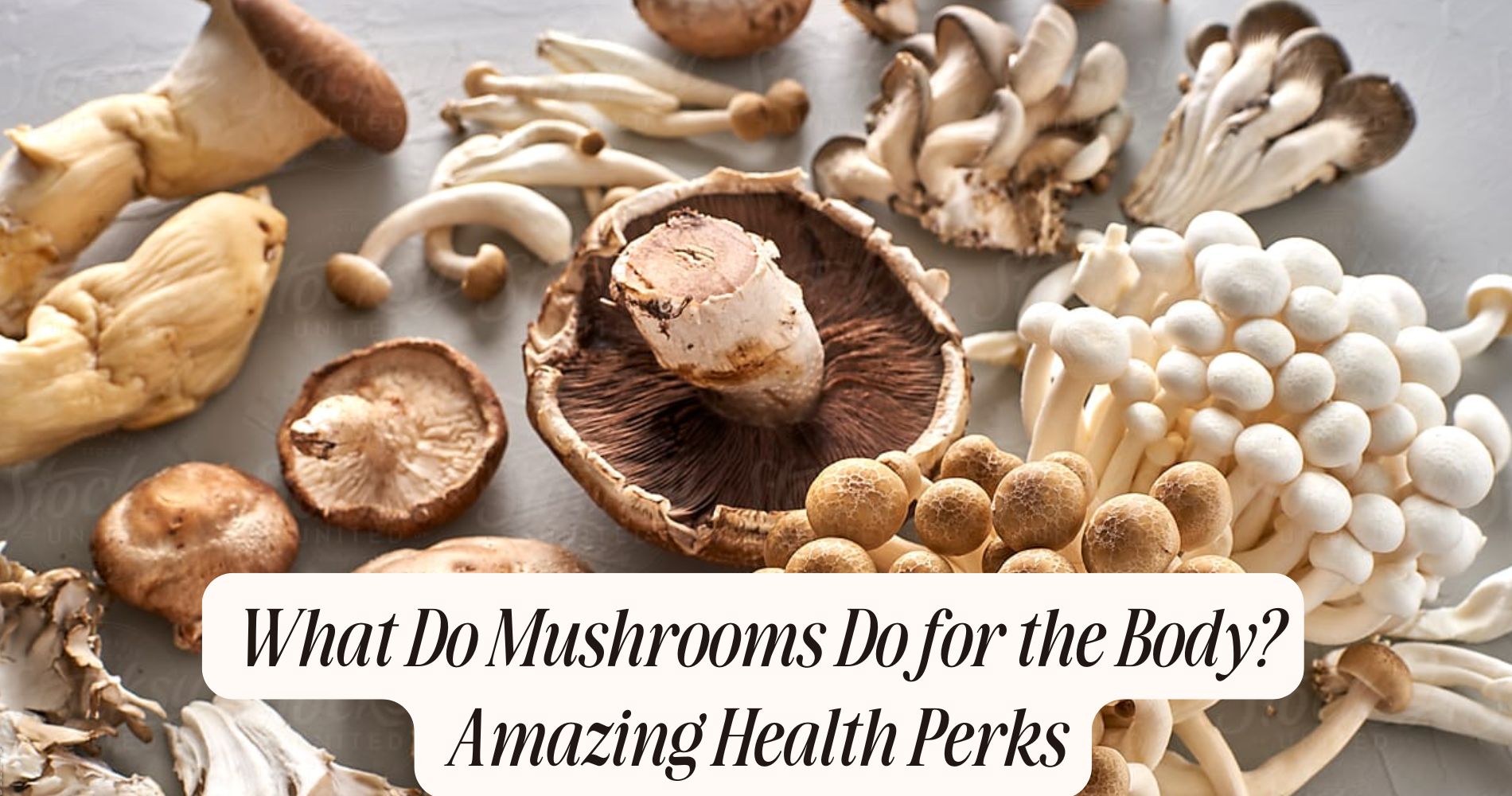
Can Eating Mushrooms Cause Fungal Infection? Myth vs Fact
Can eating mushrooms cause fungal infection? Eating mushrooms won't cause fungal infections. In fact, mushrooms are safe and nutritious when handled and cooked properly. They're a beneficial part of your diet, offering essential nutrients and immune support. While it's true that some mushrooms can carry harmful spores, proper preparation minimizes these risks. Fungal infections typically arise from factors like compromised immune systems or poor hygiene, not from consuming mushrooms. So, you can enjoy a variety of edible mushrooms without worrying about infections. Want to find out more about safe practices and myths surrounding mushrooms? There's plenty more to uncover!
Understanding Fungal Infections
Fungal infections can be perplexing, often evoking fear due to their persistence and potential severity. You might wonder about the types of fungi that can cause these infections, which range from common ones like Candida and Aspergillus to less frequent varieties. Each type has unique characteristics, and understanding them is vital for effective management.
Infection prevention is key to reducing your risk of encountering these troublesome fungi. Maintaining good hygiene practices can go a long way. For instance, keeping your skin clean and dry helps thwart fungal growth, especially in warm, moist areas of your body.

Wearing breathable clothing can also minimize the likelihood of infections.
It's essential to be aware of your environment, too. Certain settings, like damp basements or poorly ventilated areas, can harbor fungi. If you're in such spaces, taking precautions—like wearing masks or using antifungal powder—can help safeguard your health.
Nutritional Benefits of Mushrooms
Mushrooms frequently surprise people with their impressive nutritional profile. Packed with essential nutrients, they're a fantastic addition to your diet. Different mushroom varieties, like shiitake, portobello, and oyster, each offer unique health benefits. For instance, shiitake mushrooms are known for their immune-boosting properties, while portobellos are rich in potassium, which helps regulate blood pressure.
One of the standout features of mushrooms is their low-calorie count. They're an excellent choice if you're looking to maintain a healthy weight or add bulk to your meals without extra calories. Plus, they're loaded with antioxidants that combat oxidative stress, promoting overall health.
Incorporating mushrooms into your culinary uses is easy. You can sauté them, toss them into salads, or use them as a meat substitute in various dishes. Their umami flavor enhances everything from stir-fries to soups, making them a versatile ingredient in your kitchen.
Additionally, mushrooms provide essential vitamins and minerals, including B vitamins and selenium, which support energy metabolism and immune function.
Common Myths About Mushrooms
There's a lot of misinformation floating around about mushrooms that can lead to confusion and hesitation.
For instance, one common myth is that all mushrooms are toxic. While some wild mushrooms can be harmful, many edible varieties, like button and shiitake, are safe and nutritious. Myth debunking is essential here to help you confidently enjoy mushrooms without fear.

Another misconception is that eating mushrooms can lead to fungal infections. This simply isn't true. Mushrooms are a food source, not a cause of fungal infections. They don't introduce harmful fungi into your system.
You might also hear that mushrooms cause allergies in everyone. In reality, only a small percentage of people may experience allergic reactions. Most can safely consume mushrooms without issue.
Lastly, some believe that mushrooms contain hallucinogenic properties. While certain species do, the common culinary mushrooms you find in stores don't produce such effects.
How Fungal Infections Occur
Infections can happen when fungi enter your body through breaks in the skin, inhalation, or ingestion. Fungi thrive in various environments, and their reproduction methods can lead to an increased risk of infection. When spores are released into the air, you might inhale them, which can initiate respiratory infections.
Similarly, cuts or abrasions on your skin can serve as entry points, allowing fungi to invade your body directly.
There are several infection pathways that fungi can take to establish themselves in your system. For instance, if you consume contaminated food or water, fungi can enter your digestive tract and potentially cause gastrointestinal issues. Once inside, they can reproduce rapidly, overwhelming your immune system.
Infections may manifest in different ways, depending on the type of fungus and your overall health. Your body's ability to fend off these invaders plays a significant role in whether or not you'll develop an infection.
As a result, understanding how fungi enter your body and recognizing potential sources of exposure is essential in preventing fungal infections.
Scientific Evidence on Mushroom Consumption
When it comes to mushrooms, you'll find a wealth of scientific evidence highlighting their nutritional benefits.
It's essential to understand how these tasty fungi can affect your health, especially regarding fungal infection risk factors.
Additionally, research on mushroom safety can help you make informed choices about including them in your diet.
Nutritional Benefits of Mushrooms
Rich in nutrients and flavor, mushrooms offer a variety of health benefits that make them a valuable addition to your diet. With numerous mushroom varieties, each type provides unique nutritional profiles. For example, shiitake mushrooms are rich in B vitamins, while maitake mushrooms contain immune-boosting properties.
Mushrooms are low in calories and high in fiber, making them an excellent choice for weight management. They contain essential minerals like selenium, potassium, and copper, which support various bodily functions. Additionally, mushrooms are one of the few non-animal sources of vitamin D, especially when exposed to sunlight.

Research shows that regular consumption of mushrooms can help reduce the risk of chronic diseases. The antioxidants found in mushrooms combat oxidative stress and inflammation, promoting overall health. Moreover, the beta-glucans present in certain mushroom varieties can enhance immune function, helping your body fend off illness.
Incorporating a range of mushrooms into your meals not only adds depth to your dishes but also boosts your nutritional intake.
Fungal Infection Risk Factors
While mushrooms can be a delicious and nutritious addition to your diet, they also come with certain risks regarding fungal infections. Different mushroom types can carry varying levels of fungal spores that may pose a threat, especially if you're immunocompromised or have underlying health conditions.
For instance, certain wild mushrooms are known to harbor more aggressive fungi, increasing your risk of infection. When consumed, some mushroom types can potentially facilitate the growth of harmful fungi in your body, particularly if they're not properly cooked or stored.
Improper handling can lead to contamination with fungal spores, which might find a way into your system. Additionally, if you're foraging for wild mushrooms, there's a greater chance of encountering toxic varieties.
If you have a history of allergies or respiratory issues, it's wise to be cautious. Spores released by certain mushrooms can exacerbate these conditions.
Research on Mushroom Safety
Mushroom safety is a significant area of research, especially as more people incorporate them into their diets for their health benefits. Understanding mushroom toxicity is imperative, as not all mushrooms are safe to eat.
While many edible varieties, like shiitake and portobello, offer excellent nutritional benefits, some can be highly toxic and even lethal. Research continually aims to identify and classify these edible varieties while warning against the dangers of toxic species.
Studies have shown that certain compounds in mushrooms can bolster the immune system and provide antioxidant properties. However, it's important to differentiate between safe and unsafe types. For instance, the infamous Amanita phalloides, or death cap mushroom, is a stark reminder of the potential dangers lurking in the wild.
If you're considering adding mushrooms to your diet, always source them from reputable suppliers. Foraged mushrooms can be risky unless you're trained to identify them accurately.
Risk Factors for Fungal Infections
When it comes to fungal infections, certain risk factors can put you at a higher chance of getting sick.
If you're immunocompromised or don't maintain good hygiene practices, your vulnerability increases markedly.
Understanding these factors can help you take steps to protect yourself effectively.
Immunocompromised Individuals
For those with compromised immune systems, the risk of developing fungal infections markedly increases. Your immune response is vital in combating infections, and if it's weakened, you become more susceptible to various pathogens, including fungi. If you have a condition like HIV/AIDS, cancer, or are on immunosuppressive medications, you should be particularly vigilant.
Interestingly, some individuals may also have mushroom allergies, which can complicate matters. When you eat mushrooms, your body may respond negatively, leading to allergic reactions that can further stress your immune system. This stress can lower your defenses, making you more vulnerable to fungal infections.
It's important to be aware of your health status if you belong to this group. Avoiding raw mushrooms or those from untrusted sources can help minimize risks.
Always consult with your healthcare provider about your diet, especially if you're immunocompromised, to guarantee you're not inadvertently increasing your chances of infection. By taking these precautions, you can better protect yourself and maintain your health in the face of potential threats.
Poor Hygiene Practices
Poor hygiene practices greatly heighten the risk of developing fungal infections, especially for individuals with compromised immune systems. When you neglect proper hygiene, you create an environment where fungi can thrive and multiply. This is particularly vital if you have any underlying health issues.
Understanding hygiene importance is essential in preventing fungal infections. Regular handwashing, keeping your living spaces clean, and maintaining personal cleanliness can greatly reduce the chances of fungal contamination.
Contamination sources can be as simple as damp towels, unwashed clothes, or surfaces in your home. If you're not vigilant, these everyday items can harbor fungi, leading to infections.

Additionally, sharing personal items, like combs or towels, can spread fungi quickly. It's important to avoid such practices, especially in communal spaces where hygiene might be overlooked.
Safe Ways to Enjoy Mushrooms
Mushrooms can be a delicious addition to your meals, but it's crucial to know how to enjoy them safely. Start by selecting fresh mushroom varieties from a reliable source. Popular options like button, shiitake, and portobello not only taste great but also offer various health benefits.
When preparing mushrooms, always wash them thoroughly to remove any dirt or contaminants. Use proper cooking techniques, such as sautéing or grilling, to guarantee they're cooked through. Cooking mushrooms not only enhances their flavor but also helps eliminate any potential harmful bacteria.
Avoid eating raw mushrooms, as this could increase your risk of digestive issues.
If you're foraging for wild mushrooms, be cautious. Many edible varieties have toxic look-alikes, so it's better to stick with store-bought options unless you're an expert.
Finally, if you have a history of allergies or adverse reactions to fungi, consult with a healthcare professional before adding mushrooms to your diet.
Boost Your Wellness with SUPER MUSHROOM GUMMIES
Looking for an easy and tasty way to enjoy the benefits of mushrooms? Try Well Gummies' SUPER MUSHROOM GUMMIES! Packed with 10 functional mushroom types, these vegan gummies fuel your brain, energize your body, and support your immune system—all while enhancing focus and promoting calmer energy. With a delicious fresh wild berry flavor, they taste like your favorite candy without the jitters or crash. Experience balanced energy and mental clarity the natural way.
Frequently Asked Questions
Can Mushrooms Be Grown at Home Without Risk of Contamination?
Yes, you can grow mushrooms at home with proper techniques. By ensuring cleanliness and using sterilized substrates, you can minimize the risk of contamination. Following best practices in home cultivation is key to success.
Are There Specific Mushroom Types That Are More Likely to Cause Infections?
Certain mushroom types, like those from contaminated sources, can increase infection risks. Always choose fresh, well-sourced mushrooms to minimize any potential danger. Stay informed about safe varieties to enjoy without worry.
How Can I Tell if Mushrooms Are Safe to Eat?
To tell if mushrooms are safe to eat, focus on proper mushroom identification. Always research edible species and avoid foraging without guidance. Familiarize yourself with local regulations and seek expert advice to guarantee safe foraging.
Do Cooked Mushrooms Pose Less Risk of Fungal Infection?
Cooked mushrooms generally pose less risk of fungal infection. By using proper cooking methods, you enhance mushroom safety, eliminating harmful spores and bacteria. Always guarantee you cook mushrooms thoroughly to enjoy their delicious benefits without worry.
Can Mushroom Supplements Lead to Fungal Infections?
You shouldn't worry too much about mushroom supplements causing fungal infections. When taken correctly, they offer numerous supplement benefits, and their mushroom safety is generally high, provided you choose reputable brands and follow recommended dosages.
Conclusion
To summarize, eating mushrooms won't cause fungal infections, so you can enjoy their nutritional benefits without worry. While it's important to understand how fungal infections occur and recognize risk factors, the myth linking mushroom consumption to infections is unfounded. By following safe practices when preparing and consuming mushrooms, you can savor their unique flavors and health advantages. So go ahead and add mushrooms to your meals—your body will thank you!




